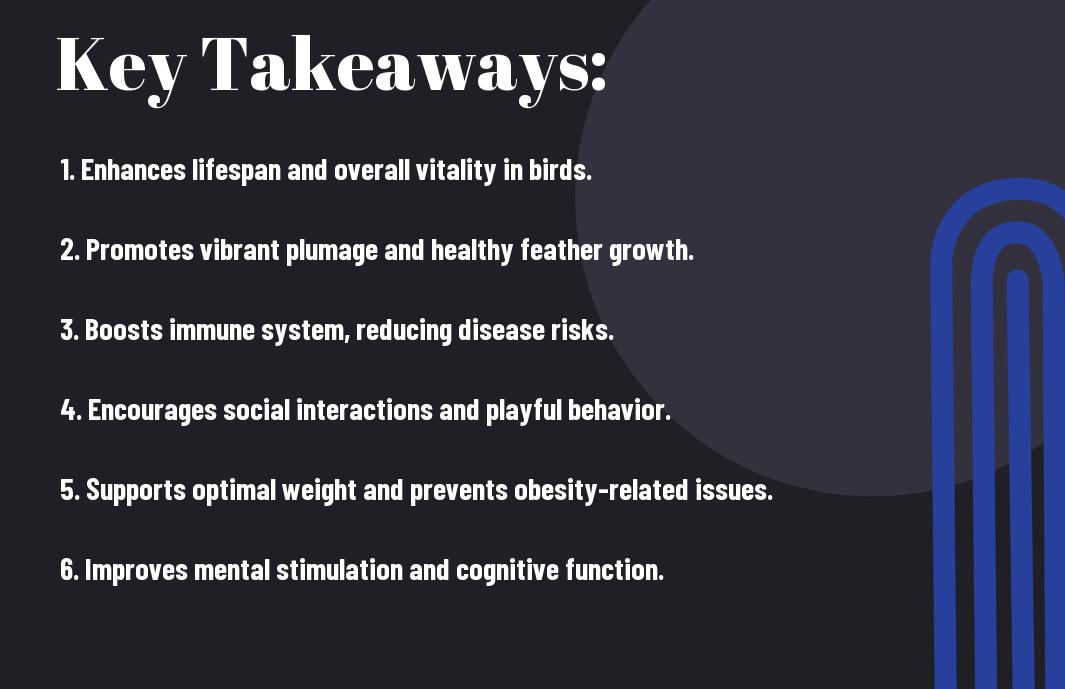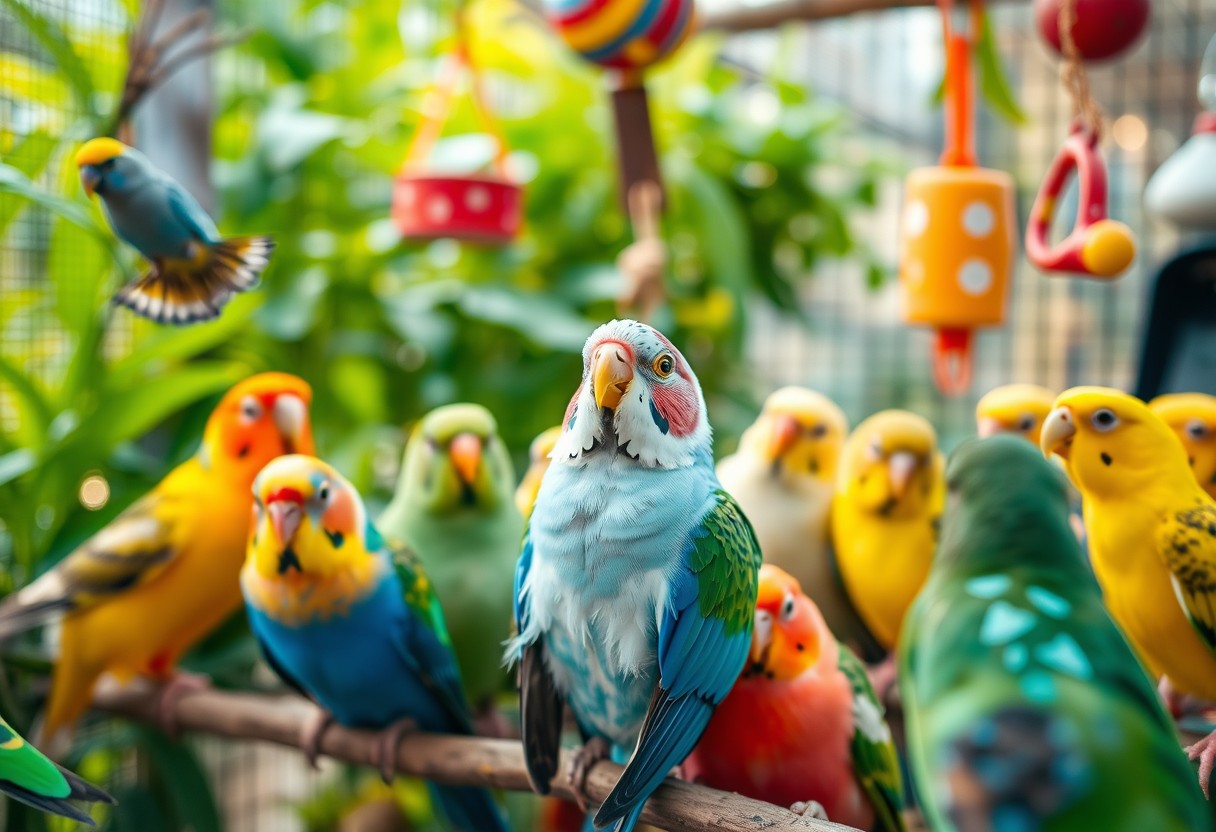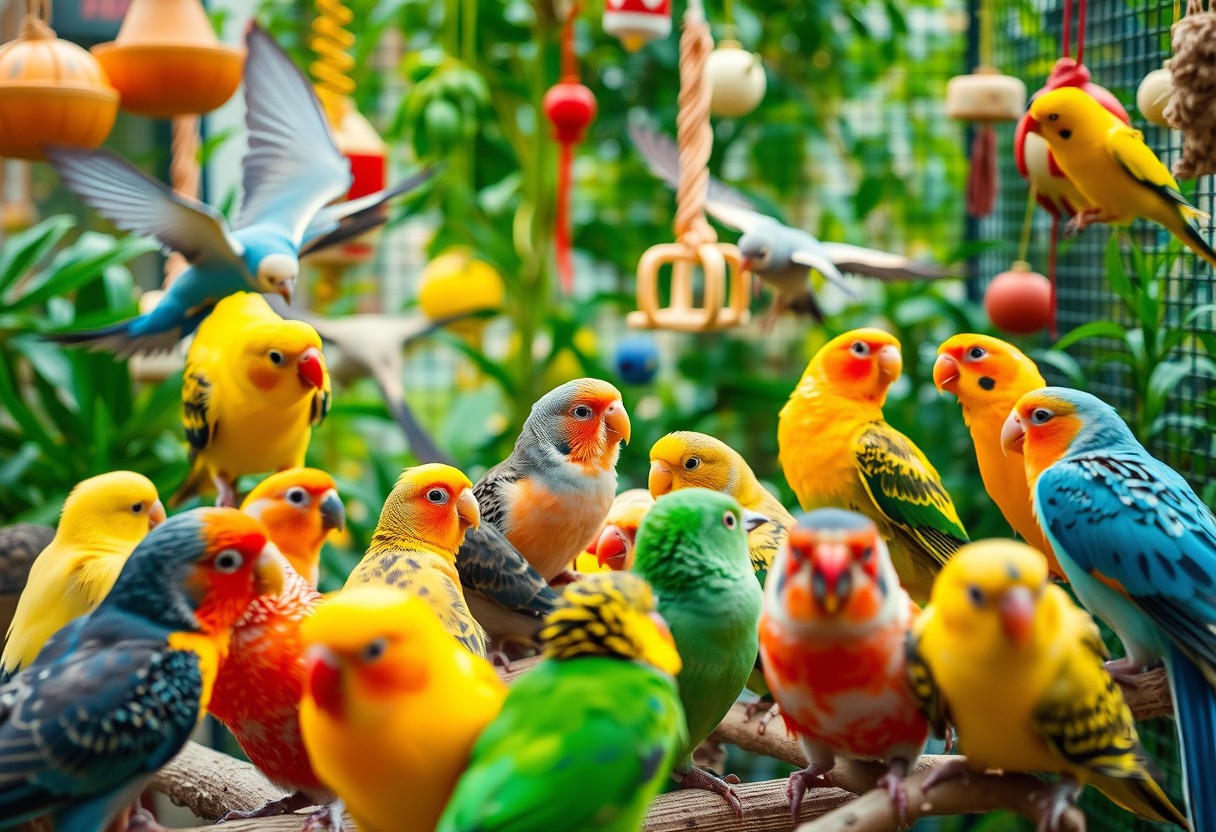There’s a profound impact a healthy lifestyle can have on your feathered friends. By providing nutritious diets, adequate exercise, and mental stimulation, you can significantly enhance their longevity and quality of life. Neglecting their health can lead to serious complications and diseases, while adopting a balanced approach ensures your birds thrive. Your commitment to their well-being not only enriches their environment but also fosters a stronger bond between you and your avian companions.


Understanding Avian Health
While keeping birds as pets can bring joy and companionship, understanding their health is crucial for ensuring their well-being. Birds, like humans, require a balanced approach to health that encompasses various aspects, including nutrition, physical activity, and social behavior. By learning about these factors, you can create a nurturing environment where your feathered friends can thrive.
Importance of Nutrition
Health is deeply influenced by the quality of nutrition you provide for your birds. A well-balanced diet that is rich in imperative nutrients, vitamins, and minerals is paramount for maintaining their health. Your birds require a varied diet that can include seeds, pellets, fresh fruits, and vegetables. Feeding them a monotonous diet can lead to nutritional deficiencies and health issues, such as obesity, liver disease, and feather plucking. Therefore, it’s imperative to research the specific dietary needs of your bird’s species to ensure they are receiving the nutrients vital for their longevity and vitality.
Additionally, keeping the diet fresh and free from spoilage is just as important as the variety. Regularly providing fresh food not only encourages better eating habits but also enhances their overall health. Pay attention to portion sizes, as overfeeding can lead to obesity. Engaging in nutrition education is a task that pays dividends, ensuring your birds remain lively and healthy.
Physical Activity and Behavior
Understanding the significance of physical activity and behavior is imperative for fostering your bird’s health. Just like humans, birds need regular exercise to maintain their physical fitness and mental stimulation. Restricting your bird’s movement can result in behavioral problems such as aggression, anxiety, and feather-biting. Therefore, creating an environment that encourages flight and play is fundamental. This can be achieved by providing ample space to fly, perches for hopping, and toys for interaction. Consider rotating toys regularly to keep your birds engaged and minimize boredom.
Understanding the behavioral needs of your birds can also help in preventing stress. Birds are social creatures, and they thrive on interaction with both their human companions and other birds. By allowing your birds to explore their surroundings, engage in play, and interact socially, you not only support their physical health but also enhance their emotional well-being. A well-stimulated bird is less likely to develop behavioral problems and will be a happier, healthier pet in the long run.

Key Components of a Healthy Lifestyle
Little changes in your bird’s environment and care routine can lead to significant improvements in their overall well-being. A healthy lifestyle for your feathered friends encompasses several key components, including a balanced diet, enrichment and mental stimulation, and social interaction. Each of these elements plays a vital role in ensuring that your birds not only survive but thrive.
Balanced Diet
For your birds to maintain optimal health, it is crucial to provide them with a balanced diet that meets their specific nutritional needs. This typically includes a combination of high-quality pellets, fresh fruits and vegetables, and occasional seeds or nuts. Each species may have unique dietary requirements, so it’s important to research what is best for your particular birds. A well-rounded diet will help prevent common health issues and keep your birds energetic and happy.
Additionally, be mindful of the foods that can be harmful or even toxic to your feathered companions. Items such as chocolate, avocado, and caffeine should never be included in their diet. By ensuring that your birds receive the right mix of nutrients, you’re taking a fundamental step towards promoting their health.
Enrichment and Mental Stimulation
On the other hand, enrichment and mental stimulation are equally important components of a healthy lifestyle for birds. Birds, being intelligent creatures, require various forms of stimulation to keep their minds engaged. This can be achieved through interactive toys, puzzles, and activities that challenge their problem-solving skills. By providing a dynamic environment filled with engaging tasks, you not only keep your birds entertained but also promote their mental health.
Another vital aspect of enrichment is giving your birds the opportunity to explore new environments safely. Rotate their toys regularly and incorporate different textures, colors, and sounds into their habitat to maintain their interest. A stimulating environment contributes to a happy bird, reducing stress and unwanted behaviors.
Social Interaction
Any bird owner knows the importance of social interaction in the lives of their feathered companions. Birds are naturally social animals, and they thrive on interaction with both their human caregivers and other birds. Regular socialization can help prevent behavioral issues stemming from boredom or loneliness, such as excessive screeching or feather plucking. Make time each day to engage with your birds, whether it be through gentle talking, petting, or playful activities.
With multiple birds, watching them interact can be incredibly rewarding and beneficial for their social skills. They learn various behaviors from each other and develop relationships, which can improve their overall quality of life. If you have a single bird, consider spending ample time with them or even introducing a companion to foster their social needs.
Preventive Care Practices
Many pet owners often underestimate the importance of preventive care practices in maintaining the health and well-being of their feathered companions. A proactive approach to caring for your bird involves regular check-ups, disease prevention, and creating a safe living environment. By prioritizing these practices, you can ensure that your bird lives a longer, healthier, and happier life.
Regular Veterinary Check-ups
One of the most critical aspects of preventive care is scheduling regular veterinary check-ups for your bird. Exotic veterinarians usually recommend annual check-ups for pet birds, which involve a thorough physical examination and may include blood work to detect underlying health issues. These evaluations can help catch potential problems before they escalate, ensuring that your bird’s health remains stable throughout its life.
Moreover, regular check-ups allow you to work closely with your veterinarian to establish a tailored care plan specific to your bird’s species, age, and unique needs. This might include discussions on dietary requirements, behavioral issues, or any other concerns that you might have. By fostering a strong relationship with your vet, you will be better equipped to provide the care your bird deserves.
Preventing Common Diseases
With regular care and attention, you can significantly reduce the risk of your bird developing common diseases. Many avian illnesses can be prevented through a combination of proper diet, hygiene, and environmental management. By providing a well-balanced diet, fresh water, and a clean living space, you fortify your bird’s immune system and maintain overall health.
Plus, maintaining a consistent routine concerning your bird’s care can help identify any health issues before they become severe. Additionally, familiarizing yourself with the signs and symptoms of common avian diseases empowers you to act quickly should you notice any troubling changes in your bird’s behavior or appearance. Quick responses can make a significant difference in your bird’s recovery and well-being.
Environmental Considerations
Preventing health issues in birds also involves making important environmental considerations. The habitat where your bird resides should be clean, safe, and stimulating. Aerating the space, providing appropriate perches, toys, and using non-toxic materials are vital for promoting cognitive and physical well-being. Avoid placing cages in areas exposed to drafts, direct sunlight, or high noise levels, as these factors can stress your bird and lead to illness.
Understanding the nuances of your bird’s environment is equally important. Evaluate your home for any potential hazards such as toxic plants, chemicals, or small objects that could be ingested. Ensuring that your bird has a safe living condition will not only contribute to its physical health but will also promote emotional well-being, allowing for a vibrant and enriching life.
Final Words
Hence, adopting a healthy lifestyle for your birds is not just a responsibility; it is an investment in their well-being and longevity. By providing nutritious food, ample exercise, and a stimulating environment, you create a nurturing space that promotes better health and happiness. A balanced diet rich in seeds, fruits, and vegetables will ensure that your birds receive the important nutrients they need to thrive. Moreover, regular social interaction and mental challenges can prevent behavioral issues, leading to a happier and more fulfilled companion.
Ultimately, the benefits of a healthy lifestyle extend well beyond mere physicality. When you prioritize health, you foster stronger bonds with your feathered friends, allowing them to express their natural behaviors and enjoy a higher quality of life. Remember that your commitment to their health significantly impacts their overall joy and vitality. Therefore, take the necessary steps to provide an environment where your birds can flourish, and you’ll reap the rewards in the form of vibrant spirits and affectionate companionship.
FAQ
Q: What are the most significant benefits of a healthy diet for birds?
A: A healthy diet is crucial for birds as it directly influences their overall health and vitality. A balanced diet rich in fruits, vegetables, seeds, and nuts contributes to optimal feather quality, increased energy levels, and better immune function. Proper nutrition helps prevent obesity, which can lead to a range of health issues including heart disease and liver problems. Additionally, certain foods provide crucial vitamins and minerals that support strong bones and healthy skin, leading to a longer and more active life for your feathered friends.
Q: How does regular exercise impact the well-being of pet birds?
A: Regular exercise is vital for the physical and mental well-being of pet birds. Exercise helps to maintain a healthy weight, encourages muscle strength, and promotes cardiovascular health. Engaging in activities, such as flying, climbing, and playing with toys, stimulates a bird’s natural behaviors and reduces the risk of boredom-related issues, such as feather plucking and behavioral problems. Moreover, providing ample opportunities for physical activity can enhance the bird’s mood and social interactions, leading to a happier and more fulfilled pet.
Q: Why is mental stimulation important in maintaining a healthy lifestyle for birds?
A: Mental stimulation is crucial for birds as it helps prevent stress and boredom, both of which can negatively impact their health. Providing a variety of toys, puzzles, and interactive games encourages cognitive development and keeps their minds sharp. Activities that involve foraging, problem-solving, and socializing not only keep birds entertained but also reduce the likelihood of destructive behaviors. A mentally stimulated bird is typically happier and more likely to engage in healthy habits, contributing to its overall well-being.










